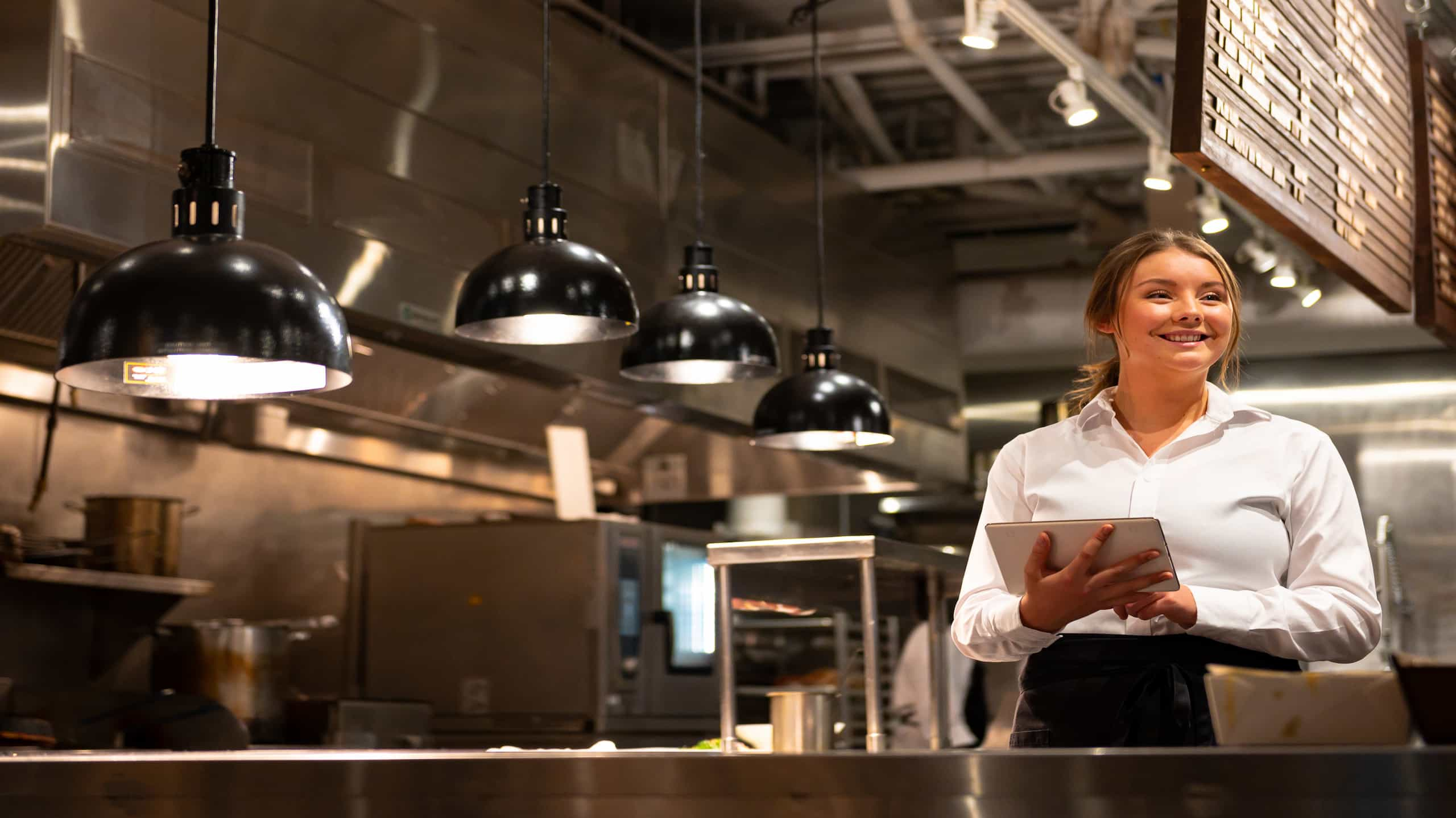


The hospitality sector is undergoing a revolutionary transformation thanks to technology. From booking hotel rooms to enhancing the guest experience and streamlining operations, digital advancements are one of the biggest hospitality trends of 2023. Come with us on a journey through digital transformation that is creating new opportunities for growth in an industry dedicated to delivering the exceptional. We will explore the innovative ways in which technology in the hospitality industry is increasing guest satisfaction and improving efficiency in hotels and restaurants.
Overview of technology in the hospitality industry
History of technology in the hospitality industry
Digital technology has had enormous effects on many aspects of the hospitality industry. This transformation began in the 1960s when computer-based reservation systems replaced traditional manual registers. By the late 1970s, televisions became a standard feature in hotel rooms. As we moved into the 1990s and beyond, the internet emerged as a powerful force. Online resources provided information to empower travelers while hotels utilized data analysis to understand guest trends better.
Benefits of technology in the hospitality industry
Technology has brought innovation and a multitude of benefits. The possibilities and advantages that technology integration offers for influencing and shaping the hospitality industry are huge.
Increased efficiency
One main advantage that comes with applying technology is improved efficiency. Through automating redundant tasks and optimizing time-consuming ones, significant progress can be made towards improving overall efficiency of hotel operations.
- Digital check-ins, especially mobile check-in, and check-outs have curtailed long waiting times at hotel desks.
- Management software assists in organizing bookings, managing room availability efficiently while handling customer data and requests swiftly.
- Tech-enabled housekeeping teams can accomplish cleaning tasks promptly without compromising quality.
Cost savings
Initial investments in technology may appear high. However, considering long-term financial implications highlights substantial savings delivered by technology.
- Energy-efficient systems like smart lighting or temperature control devices and lower utility costs considerably.
- Automation reduces labor costs as repetitive yet necessary jobs don’t require human intervention.
- Adopting digital marketing strategies over traditional methods is a cost-effective way to reach potential customers globally.
Improved guest experience
The introduction of advanced hospitality technologies, such as AI chatbots and user-friendly mobile apps, aims to enhance customer satisfaction through a personalized experience. These innovations offer instant responses to guest queries and simplify the process of reserving rooms. With digital interfaces, businesses can also provide on-demand room services and travel experiences based on data analytics. This constant pursuit of perfection in guest-centric services is key to improving a company’s reputation. Adopting new technologies becomes essential for delivering an elevated customer experience.
The tools of leadership
Combining industry-best techniques for improving guest experience with cutting-edge technology and real-world experience, you’ll learn what it takes to enhance any brand.
Bachelor in business management for hospitality
Types of technology used in the hospitality industry
Understanding the technological advances in the hospitality industry can initially feel overwhelming. However, we can simplify things by focusing on three key categories: automation and robotics, artificial intelligence, and the Internet of Things (IoT).
Automation and robotics
Robots now play a key role in carrying out repetitive or potentially unsafe activities, such as cleaning tasks where there may be exposure to harmful substances. The rise of self-ordering kiosks in restaurants demonstrates the benefits of automation, allowing orders to be processed quickly without queues or delays.
Artificial intelligence and machine learning
AI and machine learning are vital elements aligning with evolving trends in technology. This has given rise to Alexa-like voice assistants becoming commonplace inside rooms answering queries about local attractions or setting alarms based on personal routines. Beyond the surface level functionality of these applications lies machine learning. Each interaction hotel guests have with AI devices, every button they press on an app, generates data. This is where machine learning transforms this raw information into fuel that powers personalized experiences for hospitality patrons.
Internet of Things (IoT)
IoT continues to be at the forefront of technology, making its presence felt as a significant player in the hospitality industry. Its importance lies in creating a network where everyday objects, such as light bulbs and thermostats, seamlessly adapt to guests and staff.
IoT holds great promise in transforming a regular room into a ‘smart room’ that enhances the guest experience. With IoT technology, lights can automatically adjust based on natural lighting or personalized preferences, creating an intuitive environment. Intelligent sensors can optimize facility management by monitoring energy consumption, resulting in cost savings and reduced environmental impact.
Technology applications in the hospitality industry
As technology continues to make an impact across industries, it’s fascinating to observe where developments are taking the hospitality sector. Diverse tech systems has augmented services and reinvented guest experiences through smart room management systems, digital payment methods, bespoke mobile apps and modern online booking.
Smart room management systems
Smart room management has brought about a revolution in the hospitality industry. By incorporating IoT technology into everyday operations, smart hotels now have complete control over features such as temperature, lighting, and even electronic curtains, all through app or voice control. Guests can easily manage these parameters using their smartphones or through provided room controls.
Digital payment systems
The shift towards cashless transactions is also impacting the hospitality industry. From booking vacation packages to splitting meal bills, digital payments have become increasingly popular. These transactions offer convenience and eliminate the need for physical currency, which promotes operational efficiency and enhances security.
Mobile apps
Hoteliers have capitalized on the widespread use of smartphones to improve guests’ experience by offering mobile applications that incorporate AI and machine learning. This has proven to be appealing to customers, as it enhances their comfort during their stay. Beyond just bookings, these apps offer services like mobile check-in, digital keys for room access, reminders about local attractions or events, pre-ordering meals and real-time notifications about room readiness post-clean-up.
Online booking systems
Traditional travel agents are being phased out as technology advances. Online booking platforms have become dominant, offering transparency and convenience to potential guests. These platforms allow users to easily compare accommodation details and rates across different properties, finding special offers, saving them time. Online reservations provide users with the ability to customize preferences, such as requesting disability-friendly rooms or pet-friendly services.
Adoption challenges for technology in the hospitality industry
While technology has many benefits it does come with challenges. Implementing new technologies can be expensive and there can be concerns regarding security and privacy. Additionally, finding skilled personnel to manage these technologies can be a barrier to adoption. Despite these difficulties, the advantages of technological advancements in hospitality outweigh the obstacles.
High cost of implementation
One of the biggest challenges for establishments in the hospitality sector, especially smaller ones like boutique hotels or independent restaurants, is the significant upfront cost of implementing new systems. The process of completely redesigning and updating digitally can appear to be a daunting investment.
Security and privacy concerns
With the shift towards digital platforms comes a corresponding increase in security risks. Cyber-attacks are an ongoing threat to any business utilizing online technologies but are especially concerning when customers’ personal data including credit card details are at stake.
Lack of skilled personnel
A significant issue that cannot be overlooked is the shortage of skilled hotel staff who possess the necessary technological expertise. Addressing this talent crunch requires implementing comprehensive training programs and encouraging existing staff to adapt to emerging trends. Attracting new talent well-versed in navigating hotel innovations poses a challenge for many establishments.
Future trends in technology for the hospitality industry
Several emerging trends have captured significant attention and appear set to redefine guest experiences in exciting ways.
Virtual reality and augmented reality (VR/AR)
Hotels can enhance the guest experience by utilizing virtual reality (VR) and augmented reality (AR) technologies. These innovative tools are currently employed by some ultra luxury hotels, giving guests immersive virtual experiences or providing digital information about real-world locations. Hotels can offer potential guests a virtual tour of their rooms or facilities prior to booking, providing transparency that instills confidence in decision-making.
Voice recognition and voice assistants
Voice recognition technology has found applications across different industries, from healthcare to retail, and now it’s making an impact in the hospitality sector as well. Advances in this field allow for convenient control over various hotel room services through voice commands, such as lighting or room temperature. Smart speakers equipped with voice assistants like Amazon’s Alexa or Google Assistant can act as personalized concierges for guests.
Predictive analytics and big data
Predictive analytics have transformed various sectors by enabling decision-making processes backed by data. The hotel industry is no exception, as the customer touchpoint data it generates provides a valuable opportunity for leveraging big data and predictive analytics. Hotels have the ability to make informed predictions about future patterns by analyzing past data on bookings, customer preferences, and spending habits. This allows hotels to personalize offerings to meet individual guest requirements and expectations for enhanced service quality and optimizing resources.
Put the future to work now
Advance your understanding of hospitality concepts, network with industry leaders, and put your skills to the test in exclusive placements at prestigious venues.
Masters in hospitality
Impact of Covid on technology in the hospitality industry
The global pandemic had a profound impact on various industries, including hospitality. However, some innovative solutions emerged from this challenge. One solution is the implementation of advanced technology to ensure the safety and well-being of guests while providing a seamless experience. Read more about the tourism and hospitality industry in the new normal.
Contactless check in/out processes
The hospitality industry quickly embraced various technologies to reduce physical contact, showing its resilience and adaptability. One advance is the introduction of contactless check-in and check-out processes. By utilizing smart devices, guests can easily complete their check-in procedures without staff interaction or paperwork. Key cards have also transitioned into a digital format, with mobile keys accessible through smartphones.
Enhanced cleaning protocols
The hospitality industry has been adapting to evolving trends in cleanliness and hygiene. Utilizing advanced technology like UV-C light sterilization robots and electrostatic sprayers, hotels are enhancing their cleaning protocols to ensure thorough disinfection of frequently visited areas. Additionally, digital applications specific to hotels have emerged, enabling guests to notify housekeeping when a room becomes vacant for comprehensive cleaning. This proactive approach gives guests peace of mind knowing that high hygiene standards are being upheld.
Social distancing technologies
Innovative technology became crucial in enforcing social distancing measures implemented worldwide to combat the spread of Covid-19. For example, venues can now utilize capacity management solutions that provide real-time guest data, enabling efficient crowd control while still maintaining high service standards.
Hotels have also embraced advanced technology, such as AR, to enhance the guest experience while minimizing unnecessary contact with staff. AR guides guests around the premises without requiring direct interaction, ensuring social distancing measures are maintained. Additionally, AI-powered chatbots and virtual concierges provide answers to frequently asked questions, delivering efficient customer service without face-to-face interaction.
Conclusion
It’s evident how dramatically the hospitality industry has evolved thanks to technology. Innovation has enabled significant strides in enhancing efficiency and improving guest experiences. However, some challenges still persist, such as high implementation costs, concerns around security and privacy, and a shortage of skilled personnel.
Despite any challenges, one thing is clear: the future of the hospitality industry will embrace digital advancements. If you want to get ahead in modern hospitality, get started today with one of our hospitality degrees at Glion, or look at other possible careers in the hospitality industry.
Serious about your hospitality career?
Insights on the latest industry trends, career development advice, and program releases from one of the world’s leading hospitality schools.
We respect your privacy. Unsubscribe at any time.
















